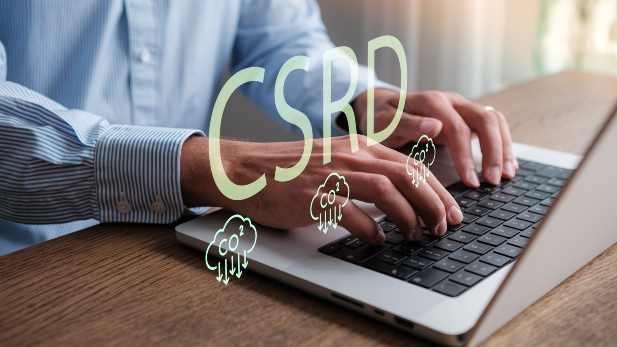New ESG regulations: A burden worth overcoming

In January 2024, the CSRD – a new EU directive (the Corporate Sustainability Reporting Directive, CSRD) will come into effect, and companies with more than 250 employees will have to report on their environmental impact among other things.
This changes the world for around 50,000 European companies. Many will have to hire new staff or consult experts, new systems for reporting need to be implemented, and many work hours will be spent on reporting.
And yet, companies should not perceive the new directive as mainly a burden, according to Andreas Rasche, Professor and Associate Dean at the CBS Sustainability Centre.
“I think it is a misleading discussion only to talk about these short-term cost effects. Yes, compliance does require investments, but in the long run, these new reporting standards can be very beneficial to the companies and help them connect to their buyers,” he says.
“This should not be a compliance game, where you just tick off a lot of boxes for the sake of bureaucracy. This should help you try to understand how your company works, and how it can do better” - Andreas Rasche
New regulations are an opportunity to learn
How exactly will the CSRD benefit these companies?
“Buyers themselves are already demanding companies to report data about their products and their CO2 emissions. The new reporting standards will help companies to meet these demands, but the new standards will also help firms to reflect on their own processes, find strengths and weaknesses and uncover their own risks and opportunities.”
For example, many firms need to gather data on how climate change affects their business. This information can help identify potential business risks. For instance, some companies face disrupted supply chains because of extreme weather events, as seen during this summer.
Not just a compliance game
Andreas Rasche advises that companies do not simply treat this as a compliance issue for the sake of satisfying the regulators but instead consider it an opportunity to improve their own business.
“This should not be a compliance game, where you just tick off a lot of boxes for the sake of bureaucracy. This should help you try to understand how your company works, and how it can do better,” he says.
He does concede that the new directive will cost money to implement, and for companies this could mean hiring new co-workers with the required expertise or paying for consultants.
But he also assures that the requirements are not enough to put companies out of business, and that the process is very much worth investing in.
“This will bring strategic foresight and help smaller companies figure out how to position themselves in the long term. Often, smaller companies already act in sustainable ways, but they do not talk about it. This directive gives them an opportunity to really showcase what they are doing for the environment, for diversity and sustainability.”
The directive will put Europe in the driver’s seat
Andreas Rasche emphasises that the demand for reporting on sustainability is not only something the EU wants. As mentioned earlier, it is already something that many buyers demand from supplying companies.
The CSRD and the new reporting standards, called ESRS, are simply a way to make sure everyone reports in a comparable manner. And he believes that implementing it now could give Europe an advantage.
“This directive is an advantage for European companies to be on the forefront of this development, building necessary expertise before their global competitors. We see similar legal developments for ESG reporting in other regions of the world as well and hence European firms can get a first mover advantage,” he says.
What is the best approach to implement CSRD?
To sum up, Andreas Rasche believes the CSRD will benefit companies in numerous ways.
- You will get to know your organisation better, which can help you prioritise and strategise.
- You will get an opportunity to tell your customers and buyers about your sustainability initiatives.
- You will build expertise in a field that will be in bigger demand in the future.
But it will undeniably require resources and investments in the short term. So, how do you go about it? We asked Andreas Rasche for his tips:
“It is very important to have commitment from the top of the company. This should not only be outsourced to the compliance unit. You need a certain top management and board commitment for the implementation of the regulations.”
From there you can start to assess what resources you have available and what processes you are already performing on sustainability.
“This will of course depend on who you are. Some companies, like Novo Nordisk, are already very advanced in this area, but many smaller companies are often doing things sustainably, even if they do not know it yet.”
He calls this process ‘making an inventory.’
“When you have assessed your existing processes and resources, you can determine if you need to onboard expertise.”
How does CSRD benefit the green transition?
The big question in this article so far, has been how the new EU ESG regulations will affect companies. But in essence the bigger question is – how will it benefit the green transition?
“This will not change CO2 emissions, but it will give transparency. After all, this is about reporting and not about actions. You can still report that you are not a very sustainable company. Reporting in itself is not the answer, but it may bring about increased transparency.”
He says it may help alleviate the problem of being accused of greenwashing.
“Currently, some companies are afraid of ‘showing off’ their contributions in fear of being accused of greenwashing, so they almost hide their sustainability achievements. They are afraid of being singled out as non-credible.”
This phenomenon of hiding green activities is called ‘greenhushing’, and according to Andreas Rasche, the new directive and standards can help clear up this issue.
“Many companies who have been afraid of being labeled as ‘greenwashers’ have gone back to a more conservative approach, even in a country like Denmark, where sustainability is not a politically contested subject, but now that everyone has to report, there are fewer possibilities to hide green credentials.”
